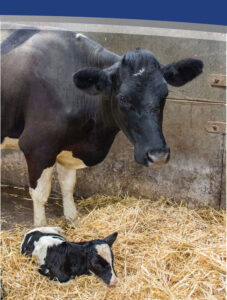Dry Cow Nutrition and Management: The Key to Quality Colostrum
Click here to view as a pdf: Dry Cow Nutrition and Management
Colostrum is one of the most important factors in raising healthy calves. Besides assuring a healthy start to the calf’s life, colostrum is known to have positive effects that increase a calf’s potential as a 1st lactation heifer. Colostrum is commonly credited for providing antibodies like immunoglobulin G (IgG), but it also supplies hormones, white blood cells and calories. With colostrum being such a vital component of calf health, it is of paramount importance that cows produce adequate volumes of high-quality colostrum. Dry cow vaccination protocols, management practices, and most importantly, dry cow nutrition, all have far-reaching influences on colostrum production and colostrum quality. Guidelines for measuring colostrum quality can be found in the calf section of Crystal Creek’s annual product catalog.
Vaccinations and Colostrum Quality
Successful vaccination of cows during the dry period creates targeted immune responses to common pathogens that cause health issues in calves. When cows produce an immune response, it stimulates the body to create antibodies, ultimately passing those antibodies into the colostrum. Rotavirus and coronavirus are two common scour-causing viruses that cows can be vaccinated for during the dry period to give the cow what is needed to protect her calf. Dry cow vaccination does not impact the volume of colostrum produced but it can significantly improve the quality of the colostrum produced.
Dry Cow Management and Housing
Bunk Space and Weigh Back: The pre-fresh dry cow diet is essential for colostrum production, but even the perfect diet will fail if cows cannot access it freely. Pre-fresh dry cows need 30” of bunk space per cow. Less than this can create competition at the bunk and smaller, or more timid cows, may not be able to spend enough time at the bunk to maintain adequate dry matter intake. Likewise, if the diet is balanced perfectly, but the bunk is empty for 5 hours of the day and the cows have nothing to eat, the diet will fail and fresh cows will not perform, or produce colostrum as they should. Pre-fresh cows should be fed to a targeted 5% weigh back to maximize dry matter intake.
Housing and Cow Comfort: Just like bunk space, resting space is imperative for pre-fresh cows. Rest is critical for rumination and comfort. Never stock pre-fresh cows over a 100% stocking density. No more than 1 cow per stall with free stalls and no more than 1 cow per 100 square feet on a bedded pack. According to Cornell University, an 80% stocking density is ideal for fresh cow performance in order to provide for appropriate colostrum and peak milk production.
Dry Cow Nutrition
Dry cow nutrition is the main factor in colostrum production and is also the easiest element to change and/or control compared to housing and bunk space. Dry cow nutrition directly impacts immune function, nutrient delivery, and the chance of metabolic diseases occurring that can decrease colostrum production. Vital components in the pre-fresh ration include mineral balance, metabolizable protein levels, and energy levels. 
Mineral Balance: Mineral balance is key for reducing the prevalence of milk fever and low levels of blood calcium (hypocalcemia). Calcium, potassium, and the overall DCAD (Dietary Cation-Anion Difference) balance help reduce the risk of calcium-related fresh cow issues that can reduce colostrum production and fresh cow performance. Trace mineral and vitamin levels are more involved in supporting the immune system of the pre-fresh cow and for antibody production. Zinc, selenium, and vitamin E are specifically important for immunity and supporting antibody production in colostrum. Crystal Creek® uses 100% chelated zinc as a zinc source and 100% Selenium Yeast as a selenium source to maximize the bioavailability of these key trace elements to pre-fresh cows. Crystal Creek® also supplies high levels of vitamin E, a powerful antioxidant that supports antibody production in colostrum, general immunity of the fresh cow, and mammary health.
Metabolizable Protein: Metabolizable protein is one of the most common offenders in pre-fresh dry cow diets when poor colostrum production is an issue. With colostrum being 14% protein, there is a huge amino acid demand on the cow at calving. To correctly balance for metabolizable protein supply to the cow, the nutritionist must have a very accurate understanding of cow size, age and exact dry matter intake. Beyond that, the ration must be balanced using a rumen model. The majority of the metabolizable protein a pre-fresh cow needs is generated by her own rumen microbes. The amount of metabolizable protein coming from the microbes is completely related to the fiber digestibility of the forages consumed and the other carbohydrates balanced with the rumen degradable protein components of the diet. Without measuring fiber digestibility and using a program that models microbial activity in the rumen, it is very possible for metabolizable protein levels to be inadequate for colostrum production in pre-fresh cows. On the opposite side of the spectrum, with highly digestible forages, you may be overfeeding protein and wasting money.
Energy Balance: Energy balance is a “thread the needle” situation in pre-fresh dry cow diets. If too little energy is provided, pre-fresh cows may lose weight and will not have the energy needed to produce 4 quarts of colostrum, which is very energy and calorie dense compared to whole milk. With too much energy, cows will put on weight before calving, adding body fat, resulting in an increased risk of ketosis after calving. Once again, the nutritionist must use a rumen model and have accurate knowledge of dry matter intake. Dry matter intake drives the overall energy supply to the cows and the fiber and starch digestibility of forages controls how much metabolizable energy the cow will get from the forage. The goal with pre-fresh cows is to maximize dry matter intake while maintaining an energy balance of 100% to 110% of the pre-fresh cow’s requirement.
If you are having colostrum quality or quantity issues or experiencing poor transition cow health in general, Crystal Creek® can help. Exploring dry cow management options and providing the proper diet for pre-fresh cows can provide solutions for your herd. Contact Crystal Creek® at 1-888-376-6777 to speak with a nutritionist today.
References available upon request.

